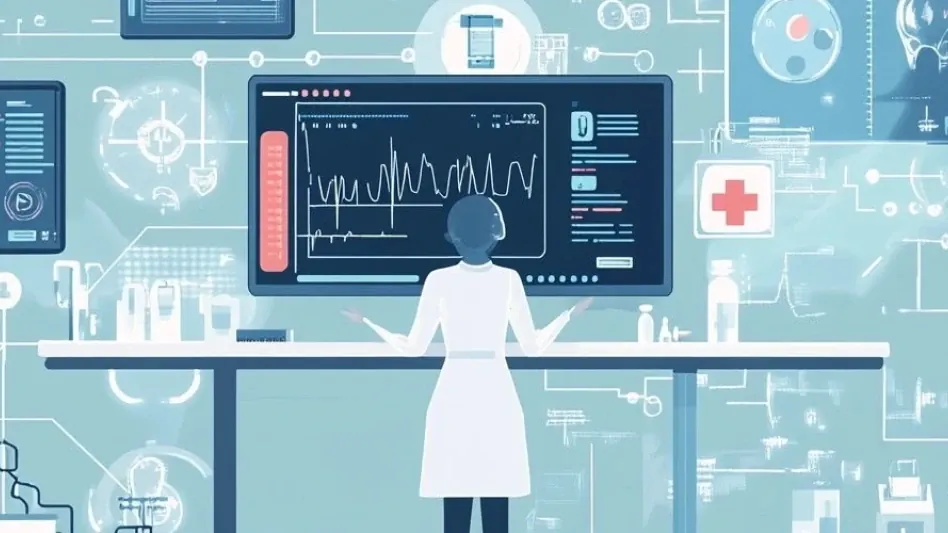The healthcare industry is grappling with a severe shortage of workers, a problem that has been exacerbated by the COVID-19 pandemic. The World Economic Forum estimates a dire shortfall of 10 million healthcare workers worldwide by 2030. Against this backdrop, AI-enhanced Electronic Health Records (EHRs) emerge as a promising solution. These AI-powered systems are not only improving operational efficiency but also alleviating the workload of healthcare practitioners, allowing them to focus more on patient care and less on administrative duties.
Streamlining Clinical Documentation
Alleviating the Burden of Data Entry
Current EHR systems are often criticized for being time-consuming, causing clinicians to spend excessive amounts of time on data entry. This can reduce the quality of patient interaction and contribute to burnout. With AI-powered EHRs, voice recognition technology can transcribe doctor-patient conversations in real-time, minimizing the need for manual entries. This not only saves time but also reduces the likelihood of errors in documentation. Voice recognition aids physicians by capturing detailed notes during consultations, which subsequently undergo verification for accuracy.
Moreover, these AI systems auto-fill patient forms by extracting relevant data from clinical notes and other sources. For example, patient portals and wearable health devices can continuously feed data into the system, ensuring a comprehensive and updated patient record. This automation allows healthcare providers to divert their attention from mundane clerical tasks to focusing on more critical clinical decisions. Physicians and nurses can thereby improve their engagement with patients, resulting in a higher quality of care and greater professional satisfaction.
Real-time Data Integration
AI-enhanced EHR systems can seamlessly integrate data from various sources, including patient portals, wellness apps, and wearable devices. By automatically collecting and organizing this data, these systems ensure that healthcare providers have a comprehensive view of a patient’s health history without the need for redundant manual input. This integration helps streamline workflow processes, reducing the administrative burden on healthcare workers. Real-time data integration also allows healthcare providers to make more informed decisions quickly, improving patient outcomes.
Furthermore, the integration of patient data from multiple sources provides a holistic view of the patient’s health. AI algorithms can detect inconsistencies or anomalies in the data, enabling early diagnosis and intervention. For instance, if a patient’s wearable device shows irregular heart rates, the AI system can instantly alert the healthcare provider for quick action. This real-time responsiveness helps in managing chronic conditions more effectively, thereby improving long-term patient care and reducing complications that typically require more intensive healthcare resources.
Improving Clinical Decision Support
Advanced Data Analytics
One of the most significant benefits of AI-powered EHRs is their ability to analyze clinical data for diagnostic and treatment support. These systems can identify patterns in patient health data, classify conditions, and even predict disease progression. For instance, by analyzing large datasets, AI algorithms can flag potential medication conflicts or allergies, thereby enhancing patient safety. This advanced data analytics capability enables healthcare providers to deliver more precise and personalized care, improving overall patient health outcomes.
AI-driven insights extend to predicting future health events based on historical data. By examining trends in a patient’s health records, the system can anticipate conditions such as diabetes or cardiovascular diseases before they fully develop. This preemptive approach minimizes the risk of complications, helping to manage patient health proactively rather than reactively. The potential to predict disease progression not only enhances individualized care but also optimizes resource allocation within healthcare facilities, focusing attention on patients who require immediate intervention.
Personalized Treatment Plans
AI-enhanced EHRs can provide personalized treatment recommendations by evaluating patient-specific health data. These systems consider various factors, such as medical history, current medications, lifestyle choices, and genetic information to propose tailored treatment plans. This level of personalization not only improves patient outcomes but also increases the efficiency of healthcare workers by providing them with actionable insights. Personalized treatment plans ensure that each patient receives the most effective care tailored to their unique health profile.
Additionally, personalized treatment plans can bridge gaps in patient care resulting from human limitations in processing large volumes of data. AI can analyze and integrate disparate data points to recommend evidence-based treatment options. This reduces the likelihood of misdiagnosis or ineffective treatments, fostering a higher standard of care. As a result, healthcare providers can feel more confident in their clinical decisions, mitigating burnout and enhancing job satisfaction. The continuous feedback loop between patient outcomes and treatment recommendations also allows for constant refinement of AI algorithms, further improving their efficacy over time.
Enhancing Patient Engagement
AI Chatbots for Improved Communication
Patient portals have become a standard feature of EHRs, offering patients a way to engage with their healthcare providers. However, AI-powered chatbots take this engagement to the next level. These intelligent virtual assistants can answer patients’ questions, schedule appointments, and send alerts for follow-up care. By managing routine inquiries, chatbots free up healthcare providers to focus on more complex tasks. Moreover, these chatbots can offer personalized responses based on patient data, making interactions more meaningful and efficient.
Beyond answering questions and scheduling, AI chatbots play a crucial role in maintaining consistent communication between patients and healthcare providers. These virtual assistants can send medication reminders, provide advice on managing chronic conditions, and offer lifestyle tips tailored to individual patient profiles. By ensuring that patients adhere to their treatment regimens and remain informed about their health, chatbots significantly enhance patient engagement. This proactive engagement can lead to better health outcomes and reduced hospital readmission rates, ultimately easing the strain on healthcare resources.
Proactive Health Monitoring
AI-powered EHRs can monitor patient health in real-time and send alerts to both patients and healthcare providers if any irregularities are detected. For example, if a patient’s wearable device indicates an abnormal heart rate, the system can notify the healthcare team immediately. This proactive approach helps in early diagnosis and intervention, thereby improving patient outcomes and reducing the workload on healthcare professionals. Patients benefit from a sense of security, knowing that their health is constantly monitored and that healthcare providers will be alerted in case of emergencies.
Continuous health monitoring also adds a layer of preventive healthcare, catching potential issues before they escalate into serious problems. For instance, AI systems can track trends like blood glucose levels, alerting both the patient and their doctor to potential spikes that could lead to diabetes. Such early warnings enable timely lifestyle adjustments or medical interventions, reducing the likelihood of severe complications in the future. This focus on preventive care not only enhances individual health outcomes but also alleviates the overall burden on healthcare systems, which often struggle to manage a high volume of critical cases.
Addressing Data Privacy and Security Concerns
Ensuring Data Confidentiality
While AI-powered EHRs offer numerous benefits, they also pose significant challenges, particularly in terms of data privacy and security. Ensuring that these systems meet stringent security standards is crucial for maintaining patient confidentiality. Advanced encryption methods and robust access controls can help safeguard sensitive patient data from cyber threats. Regular audits and compliance with regulatory standards ensure that data remains secure and that vulnerabilities are promptly addressed.
The challenge of securing patient data is compounded by the increasing sophistication of cyberattacks. Healthcare providers must invest in advanced cybersecurity measures to defend against potential breaches. Techniques such as multi-factor authentication, blockchain for data integrity, and continuous penetration testing can fortify the system against unauthorized access. A comprehensive approach to cybersecurity not only protects individual patient records but also maintains public trust in AI-powered healthcare solutions, which is essential for widespread adoption.
Reducing Algorithmic Bias
Another critical concern is the potential for bias in AI algorithms. Bias can lead to inaccurate diagnostics and treatment recommendations, impacting patient care. Continuous monitoring and updating of AI algorithms are essential to minimize bias and improve the efficacy of AI-powered EHRs. Collaboration between data scientists, healthcare professionals, and ethicists can help in developing algorithms that are fair and unbiased. Addressing these biases ensures that AI systems provide equitable care, benefiting all patients regardless of their background or condition.
Implementing a diverse dataset for training AI models is a foundational step in reducing algorithmic bias. Inclusive data ensures that the AI system accurately represents various patient demographics, thus improving its diagnostic and predictive capabilities for all population segments. Moreover, establishing transparency in AI operations—where healthcare providers understand the basis of AI recommendations—can also mitigate biases effectively. This transparency ensures that healthcare professionals can discern and rectify any discrepancies in the AI’s outputs, leading to more accurate and fair patient care.
Overcoming Implementation Challenges
Cost and Resource Allocation
Implementing AI-enhanced EHR systems can be costly, particularly for smaller healthcare organizations with limited budgets. However, the long-term benefits, such as improved efficiency and patient outcomes, can justify the initial investment. Expert consultants can assist in optimizing implementation costs and ensuring that the system is tailored to meet the specific needs of the organization. The investment in AI-powered EHRs can be seen as a strategic move to future-proof healthcare facilities by enhancing their operational capabilities and patient care quality.
Transitioning to AI systems might also necessitate phased implementation to manage costs effectively. Smaller healthcare organizations can start by integrating AI in specific departments, gradually expanding its use as budget permits. Leveraging government grants and partnerships with tech companies can also help offset initial expenses. Moreover, the savings from reduced administrative overheads, improved efficiency, and better patient outcomes can often recoup the initial investment over time, making the financial burden more manageable for smaller facilities.
Training and Adoption
The healthcare industry is currently facing a significant worker shortage, a problem that the COVID-19 pandemic has only made worse. According to the World Economic Forum, the world might be short by 10 million healthcare workers by 2030. This alarming gap presents a serious challenge for patient care, operational efficiency, and overall healthcare delivery. Amidst these difficulties, AI-enhanced Electronic Health Records (EHRs) offer a glimmer of hope. These advanced EHRs, powered by artificial intelligence, are designed to improve how healthcare systems operate. By streamlining administrative tasks, these systems allow healthcare professionals to dedicate more of their time and energy to direct patient care. In essence, AI-enhanced EHRs are reducing the burden on healthcare workers, making it possible for them to spend more time on what truly matters—caring for patients. This not only improves the quality of care but also helps to mitigate the impact of the worker shortage. Advancements in healthcare technology, especially in the realm of AI, could play a crucial role in addressing the shortage and improving the efficiency and effectiveness of healthcare delivery systems worldwide.









